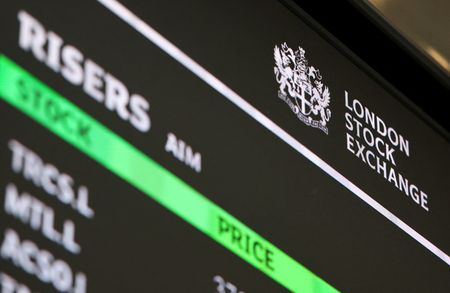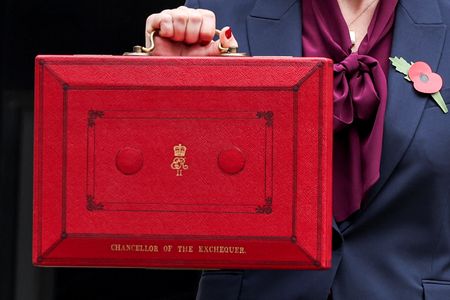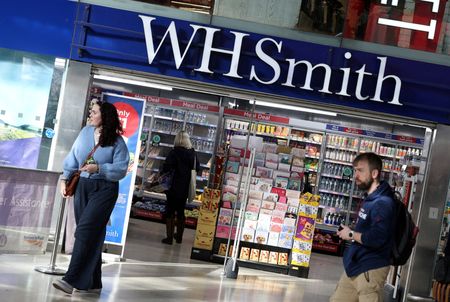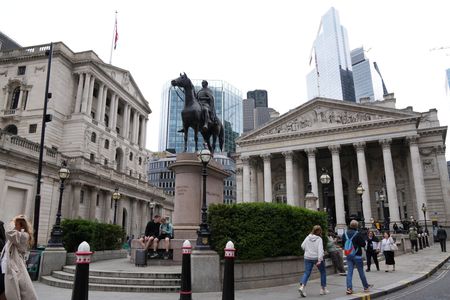By Joice Alves, Dhara Ranasinghe and Naomi Rovnick
LONDON (Reuters) -Britain’s markets face a major test in next week’s budget, with the outlook for bonds, stocks and sterling all hinging on Finance Minister Rachel Reeves striking the right balance between fiscal restraint and support for growth.
Investors were rattled on Friday by news that Reeves has no plans to raise income tax due to improved fiscal forecasts, just days after she appeared to signal a hike to underpin her own financial rules.
“Markets are looking for signs of credibility through meaningful fiscal consolidation,” said Laura Cooper, head of macro credit and global investment strategist at Nuveen.
“That means front-loading revenue-generating streams to build up a cushion for the future.”
Political risks are also on the rise as Prime Minister Keir Starmer faces criticism within his ruling Labour party.
Here’s a look at how the budget is shaping up for markets.
1/ BOND MARKETS ON ALERT
Bond markets are concerned the government could sacrifice long-term fiscal consolidation for short-term political gain.
Having fallen sharply in October, Britain’s 10-year borrowing costs on Friday saw their biggest one-day jump since July.
Markets are scarred by a rout in 2022 after the then Conservative government’s unfunded plans for tax cuts.
Big investors have called on Reeves to double her financial buffer against economic shocks from 10 billion pounds. Raising income tax is seen by some as the best way to do this.
“Without income tax, can the government raise enough revenue to avoid landing in the same fiscal squeeze over the coming year again?,” said State Street Investment Management macro policy strategist Vladimir Gorshkov.
Berenberg senior UK economist Andrew Wishart said keeping Labour’s pre-election promise not to raise the main taxes would make it difficult for Reeves to increase her fiscal headroom.
Berenberg calculates that each 1 percentage point increase in income tax rates would raise over 10.5 billion pounds in 2029-30.
2/ STERLING BECOMES A BUDGET WEATHERVANE
Investors have rounded on the pound, at its lowest in months, as the most likely victim of budget disappointment.
“Fiscal drag in the UK will put further pressure on the pound,” said Brown Brothers Harriman senior markets strategist Elias Haddad.
At around $1.31, sterling is set for a third consecutive monthly decline against the dollar, and is near its lowest levels since April 2023 versus the euro.
While investors have held bullish sterling positions for most of this year, that conviction has waned as the outlook for the economy and interest rates has become muddier.
Eren Osman, head of investment management at Arbuthnot Latham, said he was positioned for further sterling weakness because tax hikes and spending reductions would push the Bank of England towards rate cuts.
3/ WATCH RETAILERS, HOMEBUILDERS
Barclays said a positive surprise that led to lower bond yields could lift fiscally sensitive sectors in the domestically-focused FTSE-250 stock index such as housebuilders, food retail, utilities and real estate.
The index is up around 4% so far this year, while the globally-exposed FTSE 100 has surged almost 17%.
Analysts flagged potential tax rises on alcohol, gambling and tobacco, and new levies on air travel, plastics and sugary drinks. However, such measures could dampen demand and prove inflationary, they warned.
Nuveen has a preference for large-cap stocks because they are more exposed to the global economy, Cooper said.
4/ DON’T FORGET BANKS
Bank stocks too have been whipped around by pre-budget speculation, especially now Reeves appears to have ruled out income tax rises.
NatWest, Barclays and Lloyds all fell sharply on Friday, though the sector is still up more than 40% this year.
“There’s been some selling-off for the banking sector, which you could expect to be under the spotlight for taxes,” said Rory McPherson, CIO at Wren Sterling.
5/ BOE RATE CUT BETS
Money markets are pricing in a roughly 75% chance of a December rate cut from the BoE amid signs that inflation is easing. Such speculation could increase if the budget is seen as weakening the outlook for economic growth.
“What you want is the BoE to be in a situation or in a position to cut more, so on one hand, not too much drag on growth from austerity and not too much impact on inflation as well,” said Barclays head of equities Emmanuel Cau.
Any post-budget selling of gilts could be cushioned by rising rate-cut expectations.
(Reporting by Joice Alves, Naomi Rovnick and Dhara Ranasinghe. Additional reporting by Samuel Indyk and Lucy Raitano. Graphics by Alun John. Editing by Mark Potter)











